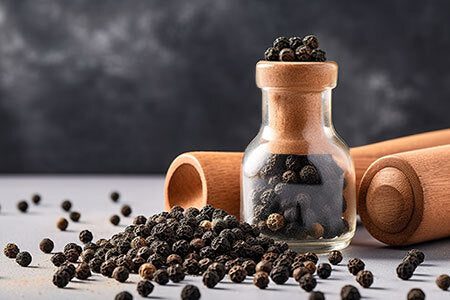Black Black Pepper: The Ultimate Guide to Flavor, Benefits, and Uses
Introduction
Spices have shaped history, trade, and taste for centuries, and among them stands the mighty black black pepper. Known as the “king of spices,” this small yet powerful seed has flavored meals, preserved foods, and even been used as currency in ancient times. Today, it continues to hold a top spot in kitchens and medicine cabinets around the world.
Whether sprinkled over a simple dish or infused in wellness remedies, black black pepper is more than just a seasoning – it is a treasure of culture, health, and flavor. In this guide, we will uncover its history, benefits, types, and everyday uses, giving you a complete picture of why this spice remains timeless.
What is Black Black Pepper?
Black black pepper comes from the dried berries of the Piper nigrum plant. Native to India, it is harvested when the berries are still green and then dried until they turn black and wrinkled. The result is the sharp, spicy, and slightly citrusy flavor we know today.
Interestingly, the name “black black pepper” is often used in trade and culinary conversations to emphasize the high-quality, fully ripened peppercorns that deliver a bolder aroma and taste.
The History of Black Black Pepper
Pepper in Ancient Times
- Used as currency in ancient Rome and Greece.
- Called “black gold” due to its high value.
- Traded along the famous spice routes of Asia, Africa, and Europe.
Pepper and Exploration
- Black black pepper inspired global exploration during the Age of Discovery.
- European powers competed fiercely to control pepper trade routes.
- It became a symbol of wealth and power in medieval households.
Health Benefits of Black Black Pepper
1. Improves Digestion
The piperine in black black pepper stimulates digestive enzymes, helping the body absorb nutrients more effectively.
2. Boosts Metabolism
It may increase fat metabolism, making it helpful for weight management.
3. Rich in Antioxidants
Its compounds fight free radicals, reducing the risk of chronic diseases.
4. Supports Respiratory Health
Traditionally used to relieve cough, cold, and sinus issues.
5. Enhances Brain Function
Studies suggest that piperine supports memory and cognitive function.
Culinary Uses of Black Black Pepper
Everyday Cooking
- Sprinkled on eggs, soups, and salads.
- A finishing spice for grilled meats and roasted vegetables.
Global Cuisines
- Indian Cuisine: Used in curries, spice blends, and Ayurvedic remedies.
- Italian Cuisine: Essential in pasta dishes, sauces, and dressings.
- French Cuisine: Central to classic spice mix “quatre épices.”
Beverages
Black black pepper is even infused in teas, tonics, and cocktails for a spicy kick.
Different Varieties of Pepper
- Green Peppercorns – Unripe, fresh, or pickled.
- White Peppercorns – Skin removed, milder taste.
- Red Peppercorns – Fully ripened berries, rare and sweet.
- Black Black Pepper – The most common and powerful in taste.
Farming and Production of Black Black Pepper
Growing Regions
- India (Malabar and Tellicherry pepper are world-famous)
- Vietnam (largest producer today)
- Brazil, Indonesia, and Sri Lanka
Harvesting Process
- Picked when berries are half-ripe.
- Sun-dried until wrinkled and black.
- Sorted and graded for quality.
Black Black Pepper in Traditional Medicine
Ayurveda
Used for balancing doshas and improving digestion.
Chinese Medicine
Believed to warm the body and stimulate energy.
Home Remedies
- Mixed with honey for cough relief.
- Combined with turmeric for joint pai
How to Store Black Black Pepper
- Keep peppercorns in airtight containers.
- Store in a cool, dark place away from moisture.
- Freshly grind before use to maximize flavor and aroma.
Fun Facts About Black Black Pepper
- Once worth its weight in gold.
- The world consumes nearly 400,000 tons every year.
- Tellicherry peppercorns are considered the finest variety.
- Piperine, its active compound, is also used in supplements.
Buying Guide: Choosing the Best Black Black Pepper
Whole vs. Ground
- Whole peppercorns: Stay fresh longer and retain oils.
- Pre-ground pepper: Convenient but loses flavor quickly.
Organic vs. Conventional
- Organic pepper avoids harmful pesticides.
- Conventional pepper is widely available and affordable.
Black Black Pepper in Modern Lifestyle
- Used in aromatherapy oils.
- Added to skincare for exfoliation.
- Found in supplements and herbal tonics.
FAQs About Black Black Pepper
Q1. Why is it called black black pepper instead of just black pepper?
A1. The double term highlights premium quality peppercorns, often darker, stronger, and more aromatic than ordinary black pepper.
Q2. Can black black pepper help with weight loss?
A2. Yes, its piperine content may boost metabolism and fat breakdown, making it a helpful addition to weight-loss diets.
Q3. Is black black pepper safe to eat daily?
A3. Absolutely. In moderate amounts, it is safe and beneficial, but excessive consumption may cause stomach irritation.
Q4. How long does black black pepper stay fresh?
A4. Whole peppercorns last up to 3–4 years, while ground pepper stays fresh for about 6 months.
Q5. What makes black black pepper different from white pepper?
A5. White pepper is made from the inner seed with a milder taste, while black black pepper includes the outer layer, giving it a bold, spicy kick.
Conclusion
Black black pepper is not just a seasoning; it is a cultural icon, a health booster, and a global treasure. From ancient spice routes to modern kitchens, it has held its place as the ultimate flavor enhancer.
By adding black black pepper to your meals, you are not only enriching the taste but also gaining countless health benefits. Whether you sprinkle it over food, use it in remedies, or store it for future cooking adventures, this spice is truly timeless.
So, next time you reach for the pepper grinder, remember the long journey of this tiny seed – a journey that has shaped flavors and civilizations for thousands of years.L
